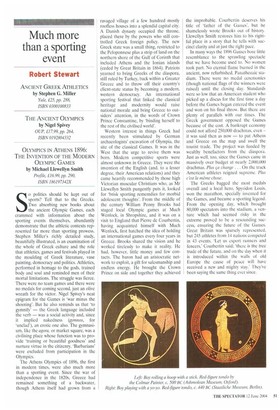Much more than a sporting event
Robert Stewart
ANCIENT GREEK ATHLETICS by Stephen G. Miller Yale, £25, pp. 288, ISBN 0300100833 THE ANCIENT OLYMPICS by Nigel Spivey OUP, £17.99, pp. 264, ISBN 0192804332 OLYMPICS IN ATHENS 1896: THE INVENTION OF THE MODERN OLYMPIC GAMES by Michael Llewellyn Smith Profile, £16.99, pp. 290, ISBN 186197342X So politics should be kept out of sports? Tell that to the Greeks. Two absorbing new books about the ancient Olympic Games, each crammed with information about the sporting events themselves, abundantly demonstrate that the athletic contexts represented far more than sporting prowess. Stephen Miller's richly detailed study, beautifully illustrated, is an examination of the whole of Greek culture and the role that athletics, games and festivals played in the moulding of Greek literature, vase painting, democracy and politics. Athletics, performed in homage to the gods, trained body and soul and reminded men of their mortal limitations. The struggle was fierce. There were no team games and there were no medals for coming second, just an olive wreath for the victor. Nigel Spivey's neat epigram for the Games is 'war minus the shooting'. But he also reminds us that `to gymnify' — the Greek language included the verb — was a social activity and, since it implied nakedness (gymnos, for 'unclad), an erotic one also. The gymnasium, like the agora, or market square, was a civilising place whose function was to provide 'training or beautiful goodness' and nurture virtue in the citizenry. 'Barbarians' were excluded from participation in the Olympics.
The Athens Olympics of 1896, the first in modern times, were also much more than a sporting event. Since the war of independence in the 1820s, Greece had remained something of a backwater, though Athens itself had grown from a ravaged village of a few hundred mostly roofless houses into a splendid capital city. A Danish dynasty occupied the throne, placed there by the powers who still controlled Greek foreign policy. The new Greek state was a small thing, restricted to the Peloponnese plus a strip of land on the northern shore of the Gulf of Corinth that included Athens and the Ionian islands (ceded by Great Britain in 1864). Patriots yearned to bring Greeks of the diaspora, still ruled by Turkey, back within a Greater Greece and to throw off their country's client-state status by becoming a modern, western democracy. An international sporting festival that linked the classical heritage and modernity would raise national morale and bring Greece to outsiders' attention, in the words of Crown Prince Constantine, by 'binding herself to the rest of the civilised world'.
Western interest in things Greek had recently been stimulated by German archaeologists' excavation of Olympia, the site of the classical Games, It was in the West that the urge to revive them was born. Modern competitive sports were almost unknown in Greece. They were the invention of the English (and, to a lesser degree, their American relations) and they came heartily recommended by those high Victorian muscular Christians who, as Mr Llewellyn Smith pungently puts it, looked for 'brisk sporting rememdies for morbid adolescent thoughts'. From the middle of the century William Penny Brooks had staged local Olympic games at Much Wenlock, in Shropshire, and it was on a visit to England that Pierre de Courbertin, having acquainted himself with Much Wen lock, first hatched the idea of holding an international games every four years in Greece. Brooks shared the vision and he worked tirelessly to make it reality. He had, however, little money and few contacts. The baron had an aristocratic network to exploit, a gift for salesmanship and endless energy. He brought the Crown Prince on side and together they achieved the improbable. Courbertin deserves his title of 'father of the Games', but he shamelessly wrote Brooks out of history. Llewellyn Smith restores him to his rightfulplace in a story that he tells with succinct clarity and at just the right pace.
In many ways the 1896 Games bore little resemblance to the sprawling spectacle that we have become used to. No women took part. No eternal flame burned in the ancient, now refurbished. Panathenaic stadium. There were no medal ceremonies (though national flags of the winners were raised) until the closing day. Standards were so low that an American student who picked up a discus for the first time a day before the Games began entered the event and won on his final throw, But there are plenty of parallels with our times. The Greek government opposed the Games because of the cost. A bankrupt economy could not afford 250,000 drachmas, even – it was said then as now — to put Athens and Greece on the map and swell the tourist trade. The project was funded by wealthy benefactors from the diaspora. Just as well, too, since the Games came in massively over budget at nearly 2,000,000 drachmas. Plus ca change . . . On the track American athletes reigned supreme. Plus c'est la meme chose.
The Greeks bagged the most medals overall and a local hero, Spyridon Louis, won the marathon, specialty invented for the Games, and became a sporting legend. From the opening day, which brought 80,000 spectators into the stadium, a venture which had seemed risky in the extreme proved to be a resounding success, ensuring the future of the Games. Great Britain was sparsely represented, but 245 athletes from 14 nations competed in 43 events. 'Let us export runners and fencers,' Courbertin said 'there is the free trade of the future, and on the day when it is introduced within the walls of old Europe the cause of peace will have received a new and mighty stay.' They've been saying the same thing ever since.


















































































 Previous page
Previous page